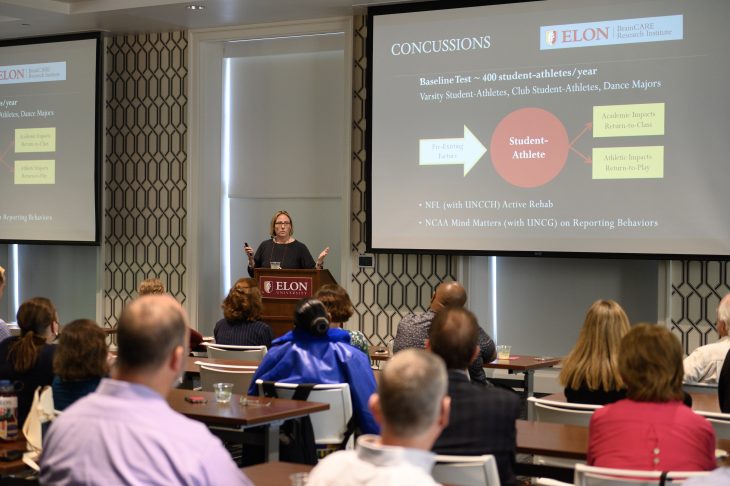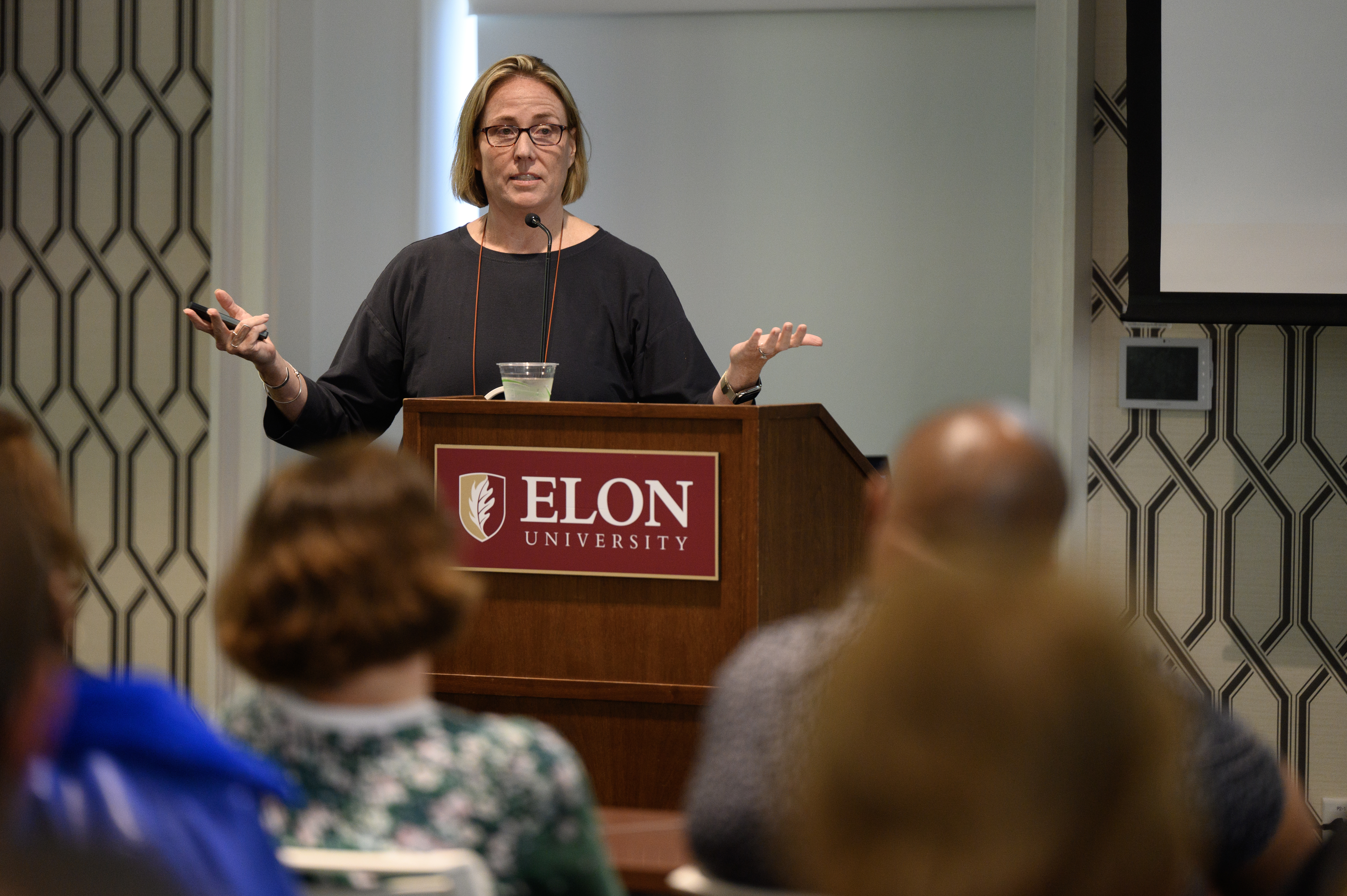In her Distinguished Scholar Lecture, "Research as the Highest Form of Play," Professor of Exercise Science Caroline Ketcham explored the many facets of her academic career, painting a picture of a scholar, mentor and steadfast collaborator.
Growing up in Big Creek, a town of less than 200 people in Fresno County, California, Caroline Ketcham gained an appreciation for movement and “play” at an early age. Both of her parents were teachers – her father in physical education and her mother in special education: “I didn’t want to do anything close to what my parents did and you will see that there was a lot of influence,” she said.
A childhood filled with swimming, hiking, bowling and volleyball, it was these early experiences that made a mark on and influenced her future work as a motor neuroscientist and now professor of exercise science at Elon University.
Ketcham, who is also the associate dean of Elon College, the College of Arts and Sciences, received the Distinguished Scholar Award in spring 2023. The award is Elon’s top faculty research award and recognizes excellence in scholarship acknowledged by both the Elon community and the large community of the candidate’s discipline.
“I’m going to take you through a journey of connecting my dots,” said Ketcham, who delivered her Distinguished Scholar Lecture on Thursday, Sept. 5, titled “Research as the Highest Form of Play,” focusing on the intersection of “play” and research, a take on Albert Einstein’s quote: “Play is the highest form of research.”

The process of research
Ketcham earned a bachelor of arts in biology and psychology from Colby College in Maine before attending Arizona State University, where she earned a master’s degree and doctorate in exercise science/motor control. Over her more than two-decade-long career, Ketcham has authored over 65 research articles and book chapters and is the co-editor of two books. She is the recipient of the Ward Family Excellence in Mentoring Award (2017), the Elon College Service Award (2014), and the School of Education Excellence in Scholarship Award (2010). Now in her 18th year at Elon, Ketcham framed her research through several perspectives, including the “power of practice” and the “power of process.”
“When I started doing bigger talks about my career, I would talk about motor matters. But as I think about it more, it’s not just motor matters; it’s what are the pieces of movement and learning how to control your body that really matter? It’s thinking about the power of practice,” said Ketcham. “I came to Elon because I believe in the process of research, and we get to do that with our students, and I love that about this place.”
Ketcham has investigated motor control among a variety of populations, including through age, neurological disease or injury, neurodiverse populations and expertise. Children have been a specific focus which is where she draws the ideas of “power of free play” and “power of risky play.”
“Thinking about how kids learn about their bodies and exploration is about play, and sometimes risky play,” Ketcham said. “If I think about the academic playground, I think about the power of experimentation and the power of intellectual risk.”
A neuroinclusive lens
Throughout her nearly hour-long lecture in LaRose Student Commons, Ketcham discussed her intellectual risk-taking in a multitude of research efforts, including looking at how using therapy balls in classrooms influenced behavior working to better understand the difficulties faced by autistic children and the impact of transcranial direct current stimulation. Some of this research is personal for Ketcham, whose son is autistic.
“We know autistic children have challenges with sensory and challenges with behavior,” said Ketcham. “Why don’t we consider the motor system? When people start telling me what’s happening, I’m like, ‘Have we considered that they can’t coordinate their body? That it’s not that they are not following directions.’”
A former student-athlete herself, Ketcham has also done extensive work studying concussions – specifically with the Elon BrainCARE Research Institute, where she is co-director with Professor of Exercise Science Eric Hall. The BrainCARE Research Institute tests about 400 student-athletes per year at Elon, finding 20 to 25 concussions. Much of the research involves trying to understand preexisting factors, symptoms that are not concussion symptoms but present similarly.
Part of this work is also developing ways for student-athletes to return to learning following concussions and making sure concussion research is inclusive, factoring in how concussions are different in neurodivergent populations.
“The neurodiversity spectrum is wide, and we have to be strength-based focused, instead of working in deficit models, which our medical system tends to do, but we don’t need to do it in education,” said Ketcham, in response to a question about neurodivergent populations. “How do we change the framework we’re working with to be inclusive? I think if we take a neuro-inclusive lens and affirm what people are doing and what’s their strengths, then they feel free to work on their challenges.”

A team sport
At the center of Ketcham’s vast array of work is collaboration and mentorship, specifically co-mentorship. In her lecture, Ketcham detailed research into co-mentorship, including a paper by the Department of Exercise Science highlighting the benefits for both students and faculty. Ketcham has mentored over 87 undergraduate research students, part of which with Hall, who is also director of undergraduate research and interim assistant provost for scholarship and creative activity.
“Students get to gain multiple perspectives and complementary strengths. It starts to expand the types of research they might be able to do,” said Ketcham. “Co-mentoring is not, ‘Come talk to Eric and then come talk to me,’ we are always in the room together. It helps students think about employability; they’re seeing different ideas from faculty come through.”
Ketcham’s appreciation for her students and collaborators was evident during her lecture as she devoted the end of the presentation to recognize the 30 students she has coauthored with.
“Research is a team sport. I haven’t done this by myself,” said Ketcham. “As I think about my career, the reason I can do all that stuff is because it’s fun, and I’m doing it with people I really care about.”



